Nicola Sacco and Bartolomeo Vanzetti were Italian immigrants who joined the early-20th-century anarchist and labor movements in Massachusetts. In 1921, they were convicted of killing a paymaster and a guard while robbing a South Braintree shoe company. They maintained their innocence. Their supporters claimed they were victims of political and anti-immigrant persecution. Both were found guilty by a jury and sentenced to death.
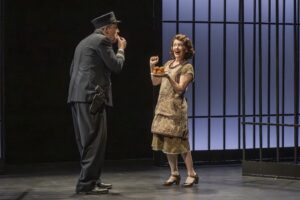
After several years of failed appeals — based on discredited testimony, conflicting evidence, and another prisoner’s confession — the men, in their 30s, died in the electric chair. Their fate sparked worldwide protests, and their guilt has been debated for a century. In 1977, Mass. Gov. Michael Dukakis issued a proclamation that Sacco and Vanzetti had been unfairly tried and convicted, so “disgrace should be forever removed from their names.”
Two years ago, Wellfleet playwright and impressario Kevin Rice began work on a play about Sacco and Vanzetti. He and Christopher Ostrom, the producing artistic director at Wellfleet Harbor Actors Theater, felt the play, Sacco & Vanzetti’s Divine Comedy, was the right topic at the right time to open WHAT’s season of new works.
The show is a provocative history lesson that feels eerily relevant. It demonstrates how Sacco and Vanzetti were the perfect scapegoats: members of an immigrant group associated with menial labor. Rice exposes the era’s prejudice against both political activism and the Italian community, whose accents, food, and games were met with suspicion.
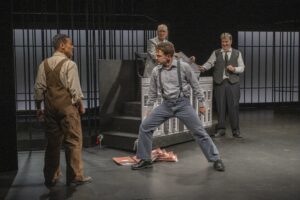
The play takes place on their final day in a cell block, represented by a series of stark, moodily lit vertical bars. Awaiting their executions, the prisoners project a lively humanity: Christopher Eastland’s Sacco is earnest, often poignantly resigned, longing for his children. Jon Vellante’s Vanzetti is more mischievous, wry, and spirited. Kathy McCafferty gives an electric performance as Rosina Sacco, a furious, determined wife who pushes for a retrial while simultaneously fussing over cooking dishes that would both end her husband’s hunger strike and be the men’s last meal.
It’s Rosina who faces down Judge Webster Thayer (Stephen Russell), reminding him that his ancestors were once foreigners, and making the case against the judge’s prejudice and corruption. Russell’s Thayer is sometimes bumbling but largely an overbearing, condescending racist, dismissing the men as “wops” and the “Dago Duo.” No matter the evidence, he’s ready to see the anarchists suffer their capital sentences. Ostrom, the show’s lighting and set designer, and Chris Tsambis, the sound designer, uncomfortably remind the audience — and the characters — of Sacco and Vanzetti’s looming fate with irregular bursts of flickering lights and loud zaps.
The “Divine Comedy” in the play’s title is Dante Alighieri’s 14th-century narrative poem. Rice incorporates the poem’s themes about hell with a line about “hell on Earth that man creates for himself.” In a dark nod to prison and America, Rice writes, “Abandon hope, all ye who enter here.” But the “comedy” is also literal, even though executing two immigrants hardly sounds funny.
Director Tim Habeger incorporates humor through slapstick antics, clownish farce, and a fast pace. Humor and satire are consistent features of Rice’s plays. (Sacco & Vanzetti’s Divine Comedy is his 12th).
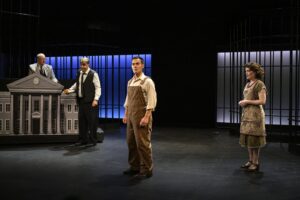
Robin Bloodworth’s genial, not-so-bright Bailiff, more diverted by Rosina’s cooking than Thayer’s histrionics, is key to putting the audience at ease. He sees these prisoners as people even as he follows orders, ultimately creating a buffoonish representation of law enforcement.
Ostrom compares the satire to Saturday Night Live’s style of commentary on horrific situations: “If you start off laughing, you’re going to be listening and engaging with the issues.” It’s a fine line to walk, and the comedic scenes largely succeed, helped along by Habeger’s precise timing, at least before the farcical tone starts to spin on for too long in the second act.
Along with humor, the play’s music is another unexpected twist. Provincetown’s Michael Sottile composed songs that express the characters’ feelings, narrate parts of the action, and comment on the proceedings.
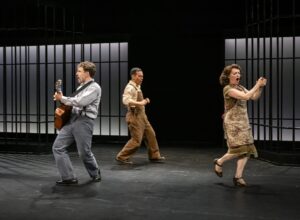
Particularly powerful is the introductory tune sung by fish-seller Vanzetti: “Perhaps you’ve heard the story/ Of me and Sacco, my best friend./ If not, think of Jesus, Joan of Arc/ Then figure out the end.” Later, the song notes, “Was it how we looked or how we spoke?/ What we wore or what we ate?/ I say that hate was the crime/ But it wasn’t Sacco’s, it wasn’t mine.”
Another song skewers the idea that Sacco and Vanzetti were judged by “a jury of their peers,” considering who was allowed to serve in that era. A clever sight gag puts a jury of white mannequins wearing men’s hats in the theater’s front rows. “I see no name with a double Z/ Just 12 Anglo men staring hard at me,” sings Eastland’s Sacco.
This story hits close to home for Rice, a third-generation Italian American who’s known about Sacco and Vanzetti since he was a child. Rice’s family lived in Milford on Pond Street, where Sacco lived for years — so Rice believes his Italian grandmother must have at least seen him. Sacco also worked in the same Milford shoe factory where Rice’s mother was employed during the 1940s and ’50s.
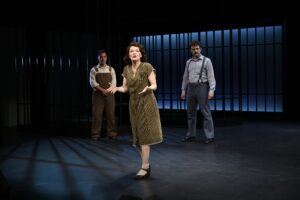
During Sacco & Vanzetti rehearsals, Milford was in the news again after 11th-grader Marcelo Gomes da Silva was taken by federal Immigration and Customs Enforcement officers while on his way to volleyball practice. Brazilian-born da Silva, who has lived in the U.S. since age 6, was detained in a windowless cell, sleeping on the floor and sometimes shackled, for six days until a judge ordered his release.
“It’s horrific that events happening in our lives are mirroring the events of this play,” Ostrom says. “I think it’s given us a greater sense of purpose. We want to entertain but also to engage people and give people an outlet to start talking and thinking about this cycle of othering and scapegoating that we just can’t break free from.”
Rice says his play is “about human beings just wanting to live.”
Gallows Humor
The event: Sacco & Vanzetti’s Divine Comedy by Kevin Rice
The time: Through July 26
The place: Wellfleet Harbor Actors Theater, 2357 Route 6
The cost: $15 to $30 at what.org



